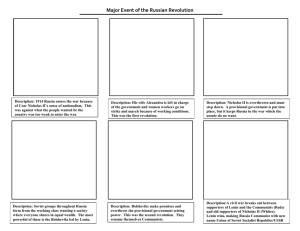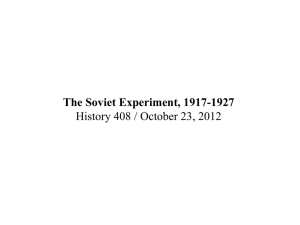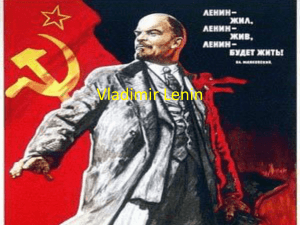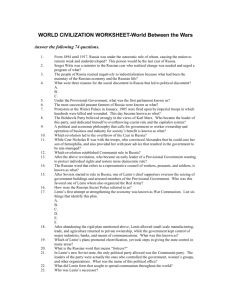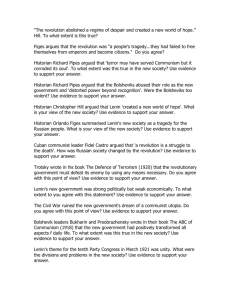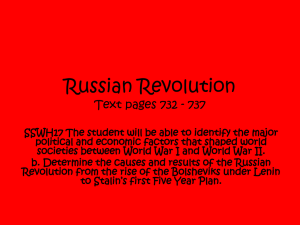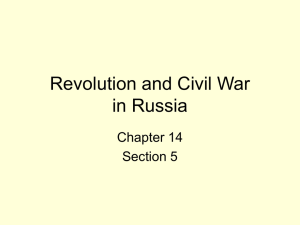Lenin's beliefs
advertisement
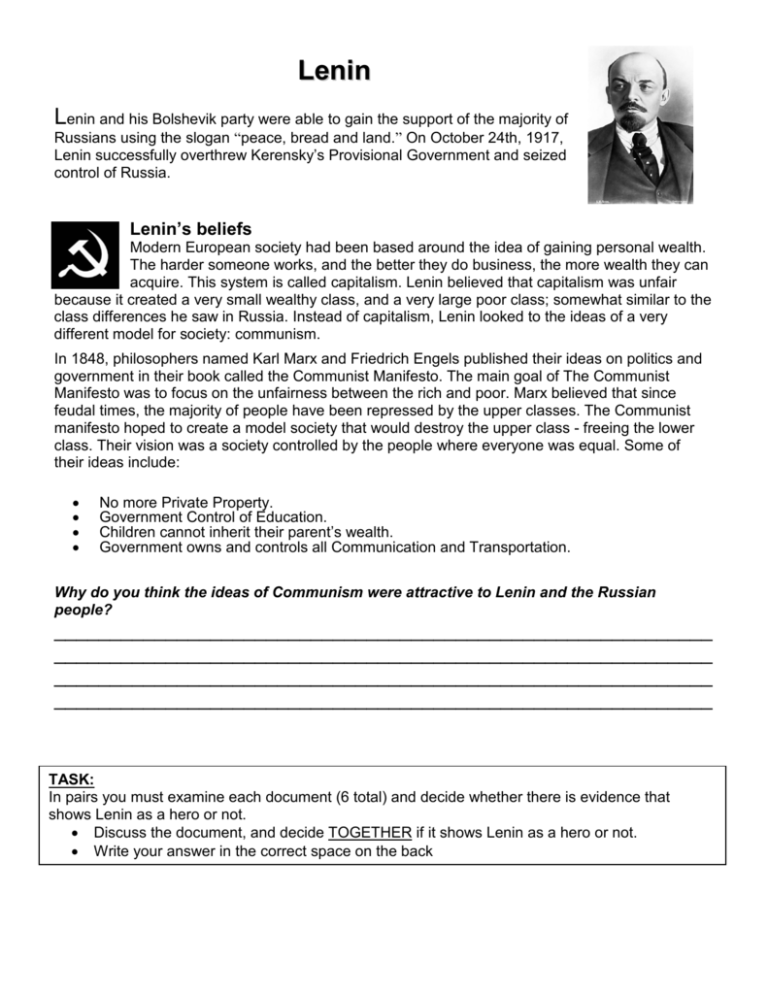
Lenin Lenin and his Bolshevik party were able to gain the support of the majority of Russians using the slogan “peace, bread and land.” On October 24th, 1917, Lenin successfully overthrew Kerensky’s Provisional Government and seized control of Russia. Lenin’s beliefs Modern European society had been based around the idea of gaining personal wealth. The harder someone works, and the better they do business, the more wealth they can acquire. This system is called capitalism. Lenin believed that capitalism was unfair because it created a very small wealthy class, and a very large poor class; somewhat similar to the class differences he saw in Russia. Instead of capitalism, Lenin looked to the ideas of a very different model for society: communism. In 1848, philosophers named Karl Marx and Friedrich Engels published their ideas on politics and government in their book called the Communist Manifesto. The main goal of The Communist Manifesto was to focus on the unfairness between the rich and poor. Marx believed that since feudal times, the majority of people have been repressed by the upper classes. The Communist manifesto hoped to create a model society that would destroy the upper class - freeing the lower class. Their vision was a society controlled by the people where everyone was equal. Some of their ideas include: • • • • No more Private Property. Government Control of Education. Children cannot inherit their parent’s wealth. Government owns and controls all Communication and Transportation. Why do you think the ideas of Communism were attractive to Lenin and the Russian people? ___________________________________________________________ ___________________________________________________________ ___________________________________________________________ ___________________________________________________________ TASK: In pairs you must examine each document (6 total) and decide whether there is evidence that shows Lenin as a hero or not. • Discuss the document, and decide TOGETHER if it shows Lenin as a hero or not. • Write your answer in the correct space on the back Document 1. The Cheka (Soviet Secret Police) 2. The Russian Civil War 3. The Killing of the Czar 4. Policies of Lenin and the Bolsheviks 5. N.E.P. (New Economic Policy) 6. Lenin Supports Jews in Russia Does this show Lenin as a hero? Explain your groups decision. ACTIVITY: With your group, create an epitaph for Lenin’s tombstone. Decide what he should be remembered for and how it should be phrased. Vladimir Lenin April 22, 1870- January 21, 1924 1. The Cheka (Soviet Secret Police) To protect the newly-established Bolshevik government from counterrevolutionaries and other political opponents, Lenin and the Bolsheviks created a secret police, the Cheka, in December 1917. It has been estimated that between 100,000 and 500,000 people were executed by the Cheka during the period known as the Red Terror, which lasted until the end of the Russian Civil War. "This Extraordinary commission... is an organ of struggle ...Acting on the home front of a civil war. It does not judge the enemy; it strikes him. We are not carrying out a war against individuals. We are exterminating the bourgeoisie (upper class) as a class... The first question we ask is -to what class does he belong, what are his origins, upbringing, education or profession? The questions define the fate of the accused This is the essence of the Red Terror". - M.Y. Latsis, Senior Official in the CHEKA 2. The Russian Civil War While Lenin and the Bolsheviks had the support of many peasants, there were still many who had different goals. From 1917-1921 there was a Civil War in Russia between the Reds (Bolsheviks) and the Whites (Tsarists). The white army wanted to restore the monarchy to power. After an uprising from the white army, below is a telegram from Lenin on his orders for handling the uprising: Comrades! The uprising in your districts must be crushed without pity! The final struggle has now begun. You must make an example of these people. 1. Hang (publicly) at least 100 people 2. Publish their names 3. Seize all of their grain Do this for miles around so people will see it, understand it, tremble, and tell themselves that anyone who rebels will be killed. August 10, 1918 3. The Killing of the Czar (July 17.1918) In the night of July 16-17, 1918, a squad of Bolshevik secret police under the leadership of Lenin, murdered Russia's last emperor, Tsar Nicholas II and his family. They were cut down in a hail of gunfire in a half-cellar room where they were being held prisoner. Description of the event by a soldier: "Yurovksy said to me, 'we must shoot them all tonight, so notify the guards not to be alarmed if they hear shots. I understood, that he had it in his mind to shoot the whole family and the doctor and the servants who lived with them, but I did not ask him where, why, or by whom the decision was made. The Czar's family did not ask any questions. They did not weep or cry. It seemed as if all of them guessed their fate, but not one of them said a single word. At this moment, 11 men entered the room. Yurovksy ordered me to leave. I left but before I got to the street I heard the firing." 4. Policies of Lenin and the Bolsheviks • All land will be distributed to the peasants • All excess food on Russian farms will be taken and given to workers in the city (requisitioning) • Censorship of the Press • Repression of all other political parties • Strengthen Red Army through conscription (draft) • The treaty of Brest-Litovsk - Russia ended its participation in World War I. It also lost Ukraine, Poland, and the Baltic States to Germany. 5. N.E.P. (New Economic Policy) March 1921 When Lenin and the Bolshevik’s took over in 1917, Russia’s economy was already in ruins. However, Lenin’s first policy of “war communism”, made things even worse. The policy of war communism meant that the Russian government took over all business and land. The takeover was more complicated than Lenin thought and many people either fled Russia or starved to death in the winter of 1920-1921. However, Lenin was aware of the problems and took a new approach in both agriculture and industry. He allowed small business owners to sell their goods for a small profit and pay a tax to the government. This was known as Lenin’s New Economic Policy. The NEP saved the Bolshevik takeover, improved the economy and fulfilled the promises of “Peace, Bread and Land”. “Comrades, Free exchange will help the peasant expand its farm and increase production. The farmer will not have his surplus (extra food) taken from him, but he can sell it and pay tax to the government.” -Lenin 3/21 6. Lenin Supports Jews in Russia As in many nations, Jews in Russia experienced severe discrimination, especially under the Czarist regime. Many Bolsheviks were Jewish and Lenin openly spoke out against anti-Semitism (antiJewish feelings) in Russia: “The Tsarist police, in alliance with the landowners and the capitalists, organized riots against the Jews. The landowners and capitalists (the rich) tried to divert the hatred of the workers and peasants who were tortured by want against the Jews. … Only the most ignorant and downtrodden people can believe the lies and slander that are spread about the Jews. … It is not the Jews who are the enemies of the working people. The enemies of the workers are the capitalists (the rich people) of all countries. Among the Jews there are working people, and they form the majority. They are our brothers, who, like us, are oppressed by the wealthy class; the Jews are our comrades in the struggle for socialism.”

